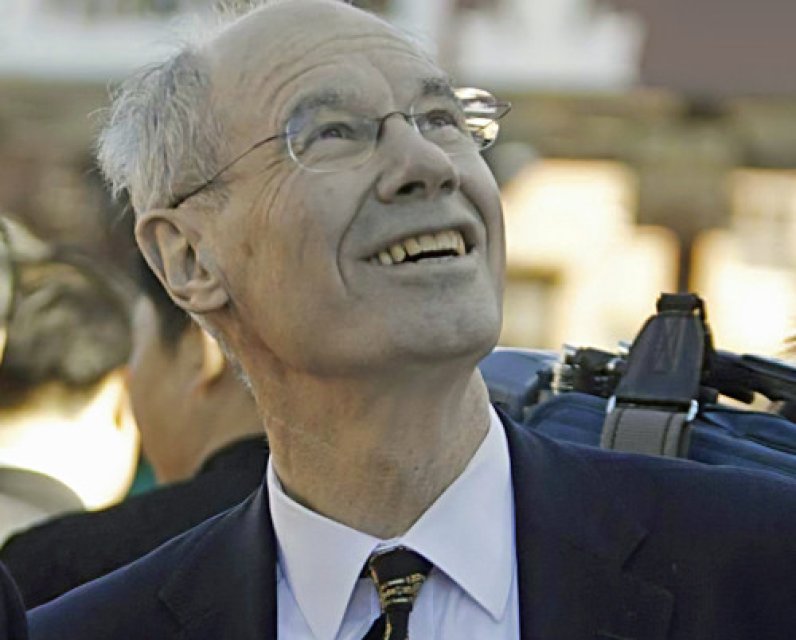Unpublished Opinions
Clive Doucet is a distinguished Canadian writer and former Ottawa city councillor. He was elected for four consecutive terms from 1997 to 2010 when he retired to run for Mayor. As a city politician he was awarded the Gallon Prize as the 2005 Canadian eco-councillor of the year. He was defeated twice by Jim Watson in 2010 and 2018 when he ran for the Mayor’s chair.
Billionaire Alert: How about charity that does something versus charity that looks good?

"We know how to build more sustainable cities and have for a long time. Getting rid of intercontinental just-in-time delivery. Advantaging the local, not disadvantaging it. Using technology as Lorinc argues to reduce greenhouse emissions. Building surface rail that pays for itself, not trillions for 18 wheel just-in-time delivery trucks and so on." --Clive Doucet
John Lorinc recently won the mouthwatering $60,000 Balsillie Prize for his book on cities. This prize is for books that are deemed to be important enough to push politicians, aka legislators, to create useful new regulations and laws. Lorinc won it with “Dream States, Smart Cities, Technology and the Pursuit of Urban Utopias”. For a subject area he chose well because cities are where Canada’s at, get them right and you get a lot right. For Canada is one of the most urbanized nations on the planet with more than 80 per cent of the Canadian population living in cities.
Happily, we have never lacked for urban planners and thinkers about cities, both domestic and imported. I’m thinking especially here of one my early heroes, Jane Jacobs and her fabulous second career after New York in Toronto as not just Canada’s but North America’s premier urban planner and philosopher.
She certainly turned my life around with the Stop Spadina movement which converted me into an urban anthropologist and someone who would spend the rest of his life working in and worrying about cities. Yet, in spite of many fine books and impressive urban thinkers which now John Lorinc joins, Canadian cities are more sprawled, more energy consuming, less sustainable cities than ever before. The Premier of Ontario has just eviscerated what little there was of a southern Ontario’s Greenbelt with Bill 23. In Ottawa, the Greenbelt has been belled not by developing it but by approving development hours away from the city centre. The distances are so great, the Ottawa Greenbelt is now contributing to sprawl instead of solving it. Mr. Sutcliffe, Ottawa’s new Mayor and Ontario’s Premier, Doug Ford are on the same page here. More housing matters but where it goes doesn’t. The problem is it does.
This is where my little essay becomes cranky and suspiciously self- serving. When I was an Ottawa City Councillor, I wrote a book titled “Urban Meltdown, Cities Climate Change and Politics as Usual”. The central thesis of Urban Meltdown was simple. Knowledge wasn’t the problem, politics is. We know how to build more sustainable cities and have for a long time. Getting rid of intercontinental just-in-time delivery. Advantaging the local, not disadvantaging it. Using technology as Lorinc argues to reduce greenhouse emissions. Building surface rail that pays for itself, not trillions for 18 wheel just-in-time delivery trucks and so on. Many have written about these problems. “The Long Emergency”, “The Geography of Nowhere” and “Asphalt nation” come to mind. Yet, it’s always business as usual and has been at every level of government. The rhetoric has changed but not the action.
All the king’s horses and all the king’s books haven’t changed the reality on the ground. As it was made clear at COP27, Canada is 56th out of 60 nations surveyed from the bottom in reducing greenhouse gas emissions. The difference between what all governments say and they actually do is really quite astonishing. In my hometown, Ottawa, the National Capital Commission has just released over 50 acres of a national heritage site, the Central Experimental Farm home to some 700 full canopy trees right next to a UNESCO world heritage site in the middle of a climate change crisis to developers. Incredibly, against the recommendations of its own planners. Could you imagine this happening in Washington or any other G7 capital?
So, what is going on? Why aren’t we doing better? It’s really quite simple as Gerry Butts has recognized in his much-read daily tweets. Developers have always been the number one investors in municipal election campaigns and in this way have elected the legislators they want. They don’t seem to care what the politicians they fund are reading. As soon as the Province of Ontario moved into legislation, (the Greenbelt) that looked to control how southern Ontario cities would grow, developers simply moved on up the funding tree to donate to provincial election campaigns with the desired effect, their guy was elected and did what they wanted.
I’m grateful that Mr. Balsillie has generously put $3 Million into Canadian literature and genuinely, delighted Mr. Lorinc’s book has been recognized, but my suggestion to Mr. Balsillie and any other billionaire who is listening - put the money where it will directly affect Canadian legislators, not books they might read. Why not award $60,000 to every Canadian politician who refuses to be funded by developers?
To get an idea of how far Mr. Balsillie’s $3 Million would go in such an endeavour, consider this: In 2018, I ran for the mayor’s chair in Ottawa and raised $60,000 from small donations. I came second. The winning candidate, Mr. Watson who as a provincial MPP, an Ottawa City Councillor and four terms as Mayor, has been funded from boy politician status to disgraced retirement by developers.
In 2018, I’m happy to report, we had a great campaign, but it was more about rhetoric than reality. $60,000 can’t compete with $600,000. And, in this last election, how does a candidate come out of nowhere with zero public sector experience and win? Three guesses.
I’m sure there will be many prize-winning books written about the dystopia of the last twenty years in Ottawa, but the damage has been done, and it’s lasting. The national farm won’t be recreated. The trees and green spaces won’t come back. We won’t get the mall out of Lansdowne Park, or the city-wide LRT system Ottawa should have had. And, in southern Ontario the "Greenbelt" will become a word, not a place. Nor can I say I’m looking forward to the prize-winning books which will be written about it.
Clive Doucet
Clive Doucet was a four term Ottawa City Councillor. He is a writer. His last book is “Grandfather’s House, Returning to Cape Breton’’ was short listed for the Dartmouth, Atlantic Canada prize. He lives in Grand Etang, Nova Scotia.



Comments
Be the first to comment